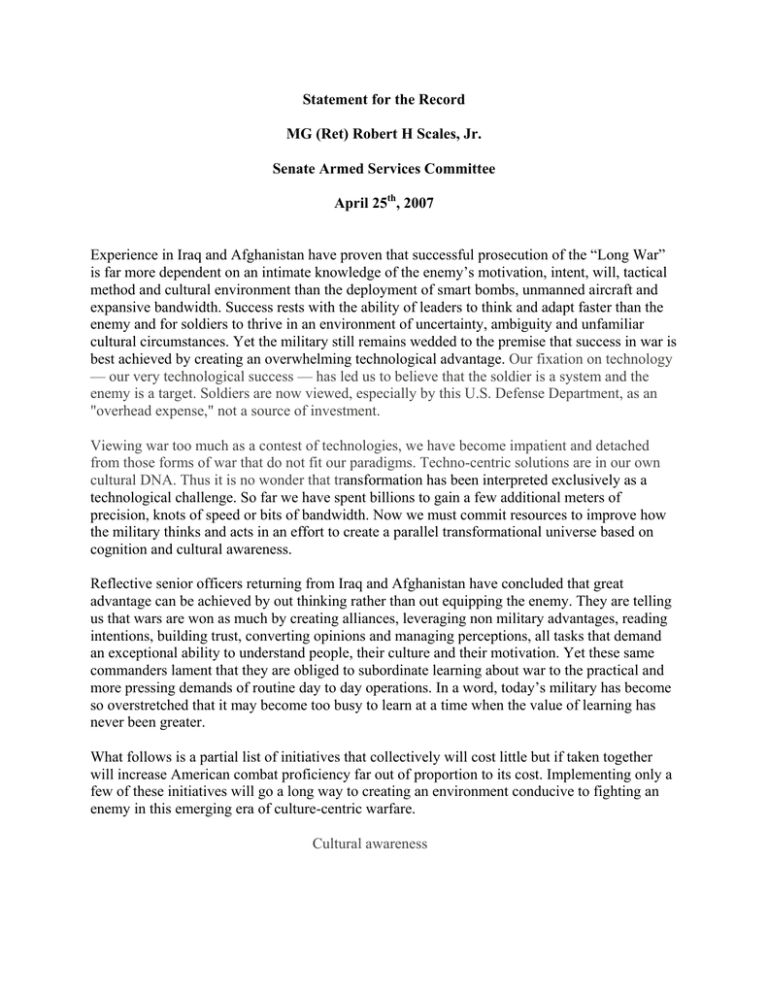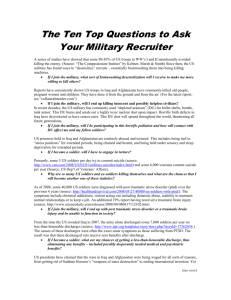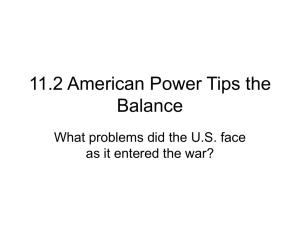Statement for the Record MG (Ret) Robert H Scales, Jr.
advertisement

Statement for the Record MG (Ret) Robert H Scales, Jr. Senate Armed Services Committee April 25th, 2007 Experience in Iraq and Afghanistan have proven that successful prosecution of the “Long War” is far more dependent on an intimate knowledge of the enemy’s motivation, intent, will, tactical method and cultural environment than the deployment of smart bombs, unmanned aircraft and expansive bandwidth. Success rests with the ability of leaders to think and adapt faster than the enemy and for soldiers to thrive in an environment of uncertainty, ambiguity and unfamiliar cultural circumstances. Yet the military still remains wedded to the premise that success in war is best achieved by creating an overwhelming technological advantage. Our fixation on technology — our very technological success — has led us to believe that the soldier is a system and the enemy is a target. Soldiers are now viewed, especially by this U.S. Defense Department, as an "overhead expense," not a source of investment. Viewing war too much as a contest of technologies, we have become impatient and detached from those forms of war that do not fit our paradigms. Techno-centric solutions are in our own cultural DNA. Thus it is no wonder that transformation has been interpreted exclusively as a technological challenge. So far we have spent billions to gain a few additional meters of precision, knots of speed or bits of bandwidth. Now we must commit resources to improve how the military thinks and acts in an effort to create a parallel transformational universe based on cognition and cultural awareness. Reflective senior officers returning from Iraq and Afghanistan have concluded that great advantage can be achieved by out thinking rather than out equipping the enemy. They are telling us that wars are won as much by creating alliances, leveraging non military advantages, reading intentions, building trust, converting opinions and managing perceptions, all tasks that demand an exceptional ability to understand people, their culture and their motivation. Yet these same commanders lament that they are obliged to subordinate learning about war to the practical and more pressing demands of routine day to day operations. In a word, today’s military has become so overstretched that it may become too busy to learn at a time when the value of learning has never been greater. What follows is a partial list of initiatives that collectively will cost little but if taken together will increase American combat proficiency far out of proportion to its cost. Implementing only a few of these initiatives will go a long way to creating an environment conducive to fighting an enemy in this emerging era of culture-centric warfare. Cultural awareness In Iraq, a curtain of cultural ignorance continues to separate the good intentions of the American soldier from Iraqis of good will. Inability to speak the language and insensitive conduct become real combat vulnerabilities that the enemy has exploited to his advantage. The military of the future must be able to go to war with enough cultural knowledge to thrive in an alien environment. Empathy will become a weapon. Soldiers must gain the ability to move comfortably among alien cultures, to establish trust and cement relationships that can be exploited in battle. Not all are fit for this kind of work. Some will remain committed to fighting the kinetic battle. But others will come to the task with intuitive cultural court sense, an innate ability to connect with other cultures. These soldiers must be identified and nurtured just as surely as the Army selects out those with innate operational court sense. Social science can help select soldiers very early who possess social and cultural intelligence. Likewise, scientific psychology can assist in designing and running cultural immersion institutions that will hasten the development of culturally adept soldiers and intelligence agents. Cultural psychology can teach us to better understand both common elements of human culture and how they differ. An understanding of these commonalities and differences can help gain local allies, fracture enemy subgroups, avoid conflicts among allies, promote beneficial alliances and undermine enemy alliances. A culturally aware military cannot be achieved just by offering language courses. Language ability is a means to an end to be sure. But the goal of a program designed to enhance cultural awareness must focus on identifying and rewarding those who exhibit these special cultural skills. No officer should be commissioned who has not had at least two years of language training. No officer should be promoted to colonel unless he or she can demonstrate a working knowledge of language spoken by peoples who inhabit threatened regions of the world. The fitness or efficiency reports of the services must be amended to include an assessment of these special talents. Building alien armies and alliances The Long War will be manpower-intensive. The U.S. cannot hope to field enough soldiers to be effective wherever the enemy appears. Effective surrogates are needed to help us fight our wars. The Army has a long tradition of creating effective indigenous armies in such remote places as Greece, Korea, Vietnam, El Salvador and now Iraq. But almost without exception, the unique skills required to perform this complex task have never been valued, and those who practice them are rarely rewarded. Today's soldiers would prefer to be recognized as operators rather than advisers. This must change. If our strategic success on a future battlefield will depend on our ability to create armies from whole cloth — or, as in Iraq, to remove an army that has been part of the problem and make it a part of the solution — then we must select, promote and put into positions of authority those who know how to build armies. Officers who have proven to be particularly effective as advisors in Iraq should be promoted very early and selected for advanced civil schooling. When these officers advance to senior rank a specific number of general officer billets must be reserved for them. We must cultivate, amplify, research and inculcate these skills in military and civilian educational institutions reserved specifically for that purpose. Perception shaping as art, not science People in many regions of the world hate us. They have been led to these beliefs by an enemy whose perception-shaping effort is as brilliant as it is diabolical. If the center of gravity in the Long War is the perception of the people, then perhaps we should learn how the enemy manipulates the people. Information technology will be of little use in this effort. Damage is only amplified when inappropriate, culturally insensitive or false messages are sent over the most sophisticated information networks. Recent advances in the social psychology of leadership and persuasion can help train soldiers to win acceptance of local populations and obtain better intelligence from locals. Recent cognitive behavioral therapy has documented remarkably effective techniques for countering fear and abiding hatred such as we see in the Middle East. Our challenge is to create a human science intended specifically for shaping opinions, particularly among alien peoples. This task is too big for a single service or event for the Defense Department. It must be a national effort superintended by distinguished academics and practitioners in the human sciences who understand such things, rather than by policy-makers who have proven in Iraq that they do not. Inculcate knowledge and teach wisdom In Iraq and Afghanistan, junior soldiers and Marines today are asked to make decisions that in previous wars were reserved for far more senior officers. A corporal standing guard in Baghdad or Fallujah can commit an act that might well affect the strategic outcome of an entire campaign. Yet the intellectual preparation of these very junior leaders is no more advanced today than it was during World War II. However, the native creativity, innovativeness and initiative exhibited by these young men and women belie their woeful lack of intellectual preparation. Learning to deal with the human and cultural complexities of this era of war will take time. Leaders, intelligence officers and soldiers must be given the time to immerse themselves in alien cultures and reflect on their profession. Yet in our haste to put more soldiers and Marines in the field, we risk breaking the intellectual institutions that create opportunities to learn. Today, we are contracting out our need for wisdom by hiring civilians to teach in military schools and colleges. Educational science has long understood that reading and listening are the least effective means for retaining or increasing knowledge. Teaching is at least an order of magnitude more effective, while researching and writing are far better still. Thus the services must change assignment and promotion polices to make learning and teaching professionally rewarding. Tactical intelligence The value of tactical intelligence — knowledge of the enemy's actions or intentions sufficiently precise and timely to kill him — has been demonstrated in Iraq and Afghanistan. Killing power is of no use unless a soldier on patrol knows who to kill. We should take away from our combat experience a commitment to leverage human sciences to make the tactical view of the enemy clearer and more certain, to be able to differentiate between the innocents and the enemy by reading actions to discern intentions. The essential tools necessary to make a soldier a superb intelligence gatherer must be imbedded in his brain rather than placed in his rucksack. He must be taught to perceive his surroundings in such a way that he can make immediate intuitive decisions about the intentions of those about him. His commanders must be taught to see the battlefield through the eyes of his soldiers. He must make decisions based on the gut feel and developed intuition that come from an intelligence gatherer's ability to see what others cannot. There is a growing science of intuition and gut feeling, and these capabilities might be enhanced by this new capability and its allied technology. Machines and processes might make intelligence easier to parse and read. But knowing the enemy better than he knows us is inherently a psycho-cultural rather than a technological, organizational or procedural challenge. Psychological and physiological tuning Life sciences offer promise that older, more mature soldiers will be able to endure the physical stresses of close combat for longer periods. This is important because experience strongly supports the conclusion that older men make better close-combat soldiers. Scientific research also suggests that social intelligence and diplomatic skills increase with age. Older soldiers are more stable in crisis situations, are less likely to be killed or wounded and are far more effective in performing the essential tasks that attend to close-in killing. Experience within special operations units also suggests that more mature soldiers are better suited for fighting in complex human environments. Science can help determine when soldiers are at their cognitive peak. Psychological instruments are available today to increase endurance and sustained attention on the battlefield. Today, conditioning science has succeeded in keeping professional athletes competitive much longer than even a decade ago. These methods should be adapted to prepare ground soldiers as well for the physical and psychological stresses of close combat. Develop high performing soldiers and small units Close combat has always been a personal and intimate experience. Close combat is the only skill that cannot be bought off the street or contracted out. In all of our world wars, success of campaigns has been threatened by a shortage of first rate, professional infantrymen. Inevitably, a protracted campaign drains the supply of intimate killers. Many infantrymen are sent into close combat with about four months' preparation. What little social science the research and development community has devote to understanding the human component in war has not been spent on close-combat soldiers. We know far more about pilot and astronaut behavior than we do about those who in the next world war will do most of the killing and dying, the close-combat soldiers. If dead soldiers constitute our greatest weakness in war, then we should, as a matter of national importance, devote resources to making them better. The enemy has drawn us unwillingly into fighting him at the tactical level of war where the importance of technology diminishes in proportion to the value of intangibles. Thus, winning the Long War will require greater attention to the tactical fight. Technology will play a part, to be sure. Our small units, squads and platoons should be equipped with only the best vehicles, small arms, sensors, radios and self-protection. But more important to victory will be human influencers such as the selection, bonding, and psychological and physical preparation of tactical units. As the battlefield expands and becomes more uncertain and lethal, it also becomes lonelier and enormously frightening for those obliged to fight close. Most recent American campaigns have been fought in unfamiliar and horrifically desolate terrain and weather. Modern social science offers some promising solutions to this problem. Recently, we have learned that soldiers can now be better tuned psychologically to endure the stresses of close combat. Tests, assessments, roleplaying exercises and careful vetting will reduce the percentage of soldiers who suffer from stress disorders after coming off the line. Cognitive sciences can be leveraged to enhance small-unit training in many ways, from speeding the acquisition and enhancing the retention of foreign languages to training soldiers in command decision-making simulators to sharpen the ability to make decisions in complex tactical situations. Cognitive sciences can be employed in the creation of highly efficient and flexible training programs that can respond to the ever-changing problems. Models of human cognition can also be used to diagnose performance failures during simulated exercises. These measures can assist in training soldiers to attend to hidden variables and to properly weigh and filter the many factors that determine optimal performance in complex decision-making tasks. But the social sciences can accelerate the process for building great small units only so much. The one ingredient necessary for creating a closely bonded unit is time. The aging of a good unit, like that of a good wine, cannot be hurried. Platoons need at least a year to develop full body and character. Because the pipeline will be so long and the probability of death so great, the ground services must create many more close-combat units than conventional logic would demand. The lesson from Iraq and Afghanistan is clear: In future wars we can never have too many closecombat units. The performance of small ground units will be so critical to success on the World War IV battlefield that we should replace Cold War methods of mass producing small units and treat them more like professional sports teams with highly paid coaching and dedicated practice with the highest quality equipment and assessment methods. Leadership and decision-making The Long War will demand intellectually ambidextrous leaders who are capable of facing a conventional enemy one moment, then shifting to an irregular threat the next moment before transitioning to the task of providing humanitarian solace to the innocent. All of these missions may have to be performed by the same commander simultaneously. Developing leaders with such a varied menu of skills takes time. There are precedents for developing these skills. In Vietnam, the air services developed "Top Gun" and "Red Flag" exercises as a means of improving the flying skills of new pilots bloodlessly before they faced a real and skilled opponent. Recent advances in the science of intuitive decision-making will give the ground services a similar ability to improve the closecombat decision-making skills of young leaders. Senior commanders will be able to use these tools to select those leaders with the intuitive right stuff. Over time, leaders must be given the tools to measure and assess improvements in their ability to make the right decisions in ever more complex and demanding combat situations. They should also have access to coaches and mentors who will pass on newly learned experiences with an exceptional degree of accountability and scientific precision. Intuitive battle command The Army and Marine Corps learned in Afghanistan and Iraq that operational planning systems inherited from the Cold War would no longer work against an elusive and adaptive enemy. They were forced to improvise a new method of campaign planning that emphasized the human component in war. Gut feel and intuition replaced hierarchical, linear processes. They learned to command by discourse rather than formal orders. Information-sharing became ubiquitous, with even the most junior leaders able to communicate in real time with each other and with their seniors. Dedicated soldier networks have fundamentally altered the relationship between leaders and led and have changed forever how the Army and Marine Corps command soldiers in battle. Developing new and effective command-and-control technologies, doctrine and procedures will do no good unless we educate leaders to exploit these opportunities fully. We have only begun to leverage the power of the learning sciences to battle command. Teaching commanders how to think and intuit rather than what to think will allow them to anticipate how the enemy will act. Convincing commanders to leave Cold War-era decision-making processes in favor of nonlinear intuitive processes will accelerate the pace and tempo of battle. The promise is enormous. But we will only achieve the full potential of this promise if we devote the resources to the research and education necessary to make it happen. Cultural and Cognitive Transformation The relationship between the military and human and behavioral scientists has, to date, been one of antipathy and neglect. Academics and behavioral practitioners have rarely violated the turf of the soldier. Many are turned off by the prospects of relating their professions to war. But most take the war against terrorism seriously. If the Army and Marine Corps give them the opportunity, they will gladly turn the best of their sciences to the future defense of our nation. We are in a race, and the times demand change. The Long War can only be won by harnessing the social and human sciences as the essential amplifiers of military performance, just as the physical sciences were the amplifiers of past world wars. Such a shift in how the defense community approaches war will require a fundamental shift in military culture. There is an old saying that the Navy and the Air Force man the equipment and the Army and Marine Corps equip the man. Surely those services that focus on the man rather than the machine should receive a disproportionate share of future defense budgets. Unfortunately, the ground services are far too committed and engaged in fighting this war to prepare adequately for the next. They need help. We can open a new cognitive and cultural transformational front by establishing a Human, Cultural and Cognitive Agency that will: • Become a social science corollary and be similar in structure and purpose to The Defense Advanced Research Projects Agency (DARPA) • Be headed by a person credentialed and esteemed in the human, cultural and cognitive scientific communities. • Bring together the best and brightest from academia, the military human science institutions, corporations and the Army, Special Forces and Marine Corps operational forces. • Have authority to conduct field experiments and studies in human performance using operational forces. • Provide recommendations regarding selection, promotion and schooling to Secretary of Defense. • Hold an annual summer study similar to the Defense Science Board in which members from corporations, the services and academia would meet to offer advice to the Secretary of Defense on issues related to the human sciences. • Have distinct budgeting authorities directly from Congress and would submit an annual assessment to Congress on the human, cultural and cognitive performance of the services, particularly the ground services. • Be given a broad charter that would include: cultural awareness training and education; perception and opinion shaping; in extremis decision-making in war; small unit and individual performance; intelligence analyst training and education; intuitive battle command; individual combat performance assessment and measurement; psychological tuning and hardening; language science, among many other subjects and initiatives. • Establish criteria for, fund and manage a program of advanced civil schooling in cultural awareness and the art of war for officers in the ground services. Officers selected for cultural and cognitive degrees would come principally from the operational forces and upon completion of study would be utilized principally in command and staff billets in Marine and Army fighting units. Officers completing these degrees would gain full joint credentialing through the grade of colonel. • Affiliate and locate with a major university with a solid reputation in human and social science. We cannot expect the scientific and bureaucratic institutions that won two world wars and the Cold War by exploiting the physical sciences to easily embrace a social and human sciences approach to the same challenges. But the wars in Iraq and Afghanistan clearly prove that a human approach to future wars is now our most glaring shortcoming and greatest challenge. Transformation in the human dimension will take resources and time. The shortest commodity is time. We must begin immediately to put in place the structures that will optimize what little time we have available.




